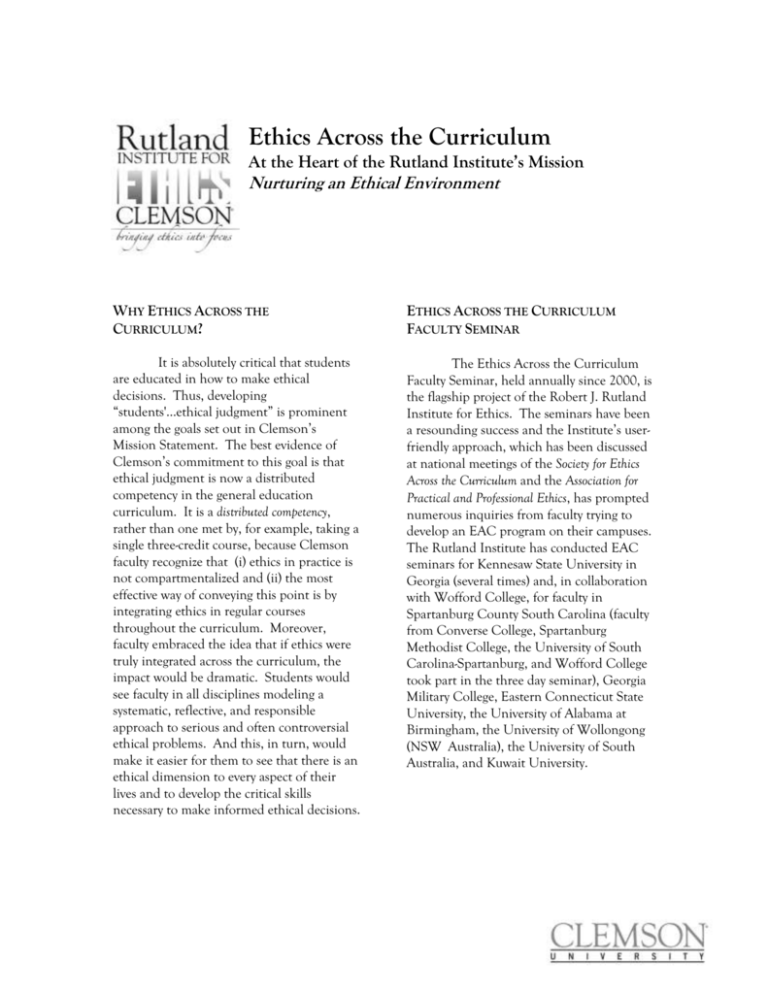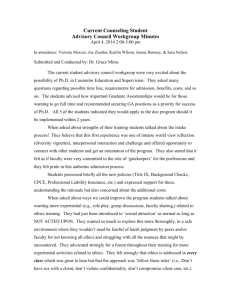Ethics Across the Curriculum at Clemson University
advertisement

Ethics Across the Curriculum At the Heart of the Rutland Institute’s Mission Nurturing an Ethical Environment WHY ETHICS ACROSS THE CURRICULUM? ETHICS ACROSS THE CURRICULUM FACULTY SEMINAR It is absolutely critical that students are educated in how to make ethical decisions. Thus, developing “students'…ethical judgment” is prominent among the goals set out in Clemson’s Mission Statement. The best evidence of Clemson’s commitment to this goal is that ethical judgment is now a distributed competency in the general education curriculum. It is a distributed competency, rather than one met by, for example, taking a single three-credit course, because Clemson faculty recognize that (i) ethics in practice is not compartmentalized and (ii) the most effective way of conveying this point is by integrating ethics in regular courses throughout the curriculum. Moreover, faculty embraced the idea that if ethics were truly integrated across the curriculum, the impact would be dramatic. Students would see faculty in all disciplines modeling a systematic, reflective, and responsible approach to serious and often controversial ethical problems. And this, in turn, would make it easier for them to see that there is an ethical dimension to every aspect of their lives and to develop the critical skills necessary to make informed ethical decisions. The Ethics Across the Curriculum Faculty Seminar, held annually since 2000, is the flagship project of the Robert J. Rutland Institute for Ethics. The seminars have been a resounding success and the Institute’s userfriendly approach, which has been discussed at national meetings of the Society for Ethics Across the Curriculum and the Association for Practical and Professional Ethics, has prompted numerous inquiries from faculty trying to develop an EAC program on their campuses. The Rutland Institute has conducted EAC seminars for Kennesaw State University in Georgia (several times) and, in collaboration with Wofford College, for faculty in Spartanburg County South Carolina (faculty from Converse College, Spartanburg Methodist College, the University of South Carolina-Spartanburg, and Wofford College took part in the three day seminar), Georgia Military College, Eastern Connecticut State University, the University of Alabama at Birmingham, the University of Wollongong (NSW Australia), the University of South Australia, and Kuwait University. EAC FACULTY SEMINARS HAVE PRACTICAL GOALS At most colleges and universities faculty in a department of philosophy have the primary responsibility for teaching ethics. At Clemson, for the reasons noted above, this responsibility, like the general education competency to which it is linked, is distributed. While non-philosophy faculty regularly encounter ethical issues in their teaching and professional work, they are often unsure about how to introduce ethical discussions into their classes systematically and with real content. They are, as it were, afraid of the water. This is not unreasonable; presenting ethical problems in a way that forces students to think carefully about the positions they hold and why they hold them, as opposed to merely defending prior opinions without much thought, is a significant challenge. However, this fear of the water can be overcome. Indeed, that is what the EAC seminar is designed to do. Participants won’t emerge as Olympic swimmers—which isn’t the aim anyway—but they will be able to “swim” well enough to show their students that venturing into ethical waters one can do much more than flail about or drown in a sea of mere opinion. The impact of such a showing can be quite substantial. The Rutland Institute’s EAC seminars are designed to be user-friendly. We avoid abstract theory in favor of equipping participants with a few basic tools. First, we get clear about what ethics is and what it isn’t. We use hypothetical cases to elicit some basic ethical ideas and develop them in a user-friendly way; we do this with an eye to application. We’re not trying to make ethics experts of faculty in, say, biology, engineering, or literature. Rather, our aim is to prepare faculty to integrate ethics into their regular classes by engaging their students in discussion while modeling for them a systematic, reflective and responsible approach to ethical issues. With that in mind we also identify some wrong moves their students will almost certainly make and discuss techniques for handling them. Then we turn to case studies. The cases are discussed in small group sessions and subsequently in a plenary session. Both sorts of sessions provide opportunities for the refinement of techniques learned as well as the introduction, in the context of ethical discussion (as opposed to lecture), of the discipline-specific expertise participants have respecting particular issues. The idea is to model as closely as possible the kinds of teaching situations seminar participants will actually encounter. One important point emerges in these settings: while with respect to discipline-specific questions the participants are indeed experts, what they have to say about an ethical issue is not necessarily decisive. This is precisely the position they will be in when ethical issues come up in their classes. In addition to being equipped to engage their students in meaningful ethical discourse, which requires that they have a grasp of some basic ethical ideas and know how to handle the wrong moves students are likely to make, they need to “have been there and done that” to feel truly comfortable integrating ethics into their regular classes. The seminars are designed to create these “bankable or take-home experiences” so that faculty are prepared to help their students see that and how ethical issues can be approached in a systematic, reflective and responsible way. 2








